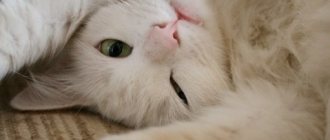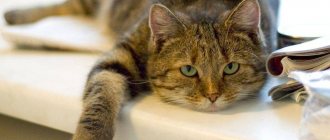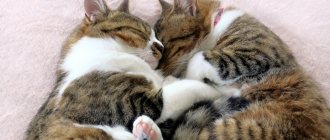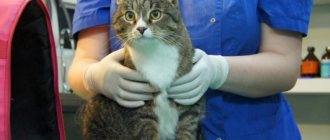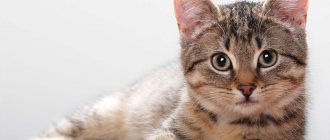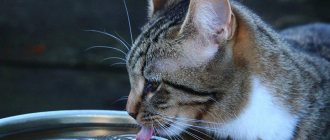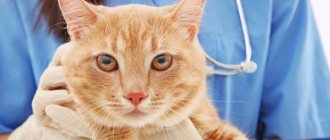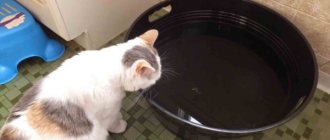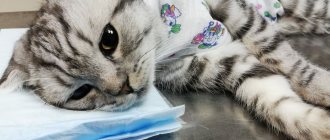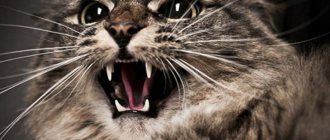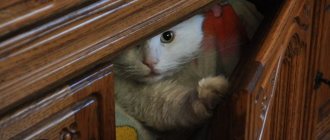Possible postoperative complications
If a cat does not eat or drink after surgery, this makes the owners worry, so the question arises of how to help their pet and whether this may indicate the presence of serious complications.
After sterilization, it takes time to recover
It is absolutely normal for a cat to eat poorly after sterilization or a cat after castration during the first 24 hours. All the animal does is sleep and sometimes get up to drink some water.
Important! If the animal cannot get up on its own to drink water, then it must be given water periodically.
In addition, there is no need to panic if the cat goes to the toilet under itself or vomits; this is also quite possible until the threads are removed from the seam. Veterinarians recommend that owners do not touch the cat during the first two days and, if it does not want to eat, there is no need to force food. The animal will be able to go without food for several days, while its body will use up previously accumulated calories to maintain satiety.
The postoperative period will be painful for the cat, but it will gradually recover. In addition, she will receive injections to maintain fluid balance.
The animal needs to be allocated a secluded corner that will be quiet and calm so that the cat can rest and get enough sleep. You should definitely put a bowl of fresh food nearby.
Note! If there are other animals in the house besides the cat, they must be isolated until the sterilized animal is completely restored.
If a cat does not eat or drink for several days after sterilization, then you should urgently seek veterinary help, because such a condition may indicate the development of serious diseases.
Postoperative complications may be as follows:
- development of sepsis;
- intestinal atony or obstruction;
- kidney or liver problems;
- hernia;
- inflammation of the peritoneum;
- infectious infection;
- suppuration of the sutures or their divergence.
Complications after surgery can vary
If at least one negative symptom appears, you must seek help from a specialist; treatment at home is unacceptable, because there is a threat to the pet’s life.
When can you give a cat water after sterilization?
When picking up your cat from the clinic, you should check with your veterinarian when you can drink water after sterilization.
Typically, experts do not recommend giving the animal water within three hours after waking up from anesthesia. This is justified by the physiological factors of the body and the characteristics of the effects of narcotic drugs on the central nervous system.
- Under the influence of anesthesia, the swallowing reflex is partially suppressed, the recovery of which takes 2 to 3 hours. Impaired swallowing function can lead to fluid entering the respiratory system, which subsequently triggers the development of pneumonia. And when a large amount of water is swallowed, suffocation occurs.
- Toxic substances included in narcotic drugs, irritating certain centers of the brain, cause attacks of nausea. Water your cat drinks can cause vomiting, which causes severe tension on the abdominal walls, leading to suture dehiscence or internal bleeding.
Important! The water in the bowl should be at room temperature or slightly warm, as cold liquid can cause a sharp spasm of the throat, esophagus and stomach, causing vomiting.
Anesthesia is the cause of lack of appetite
Cat after sterilization: care at home
During surgery, veterinarians use general anesthesia as it helps numb the surgical site. Another advantage of anesthesia is that the cat will not escape from the operating table and will not inflict even greater injuries or mutilation on itself.
But the effect of anesthesia after the operation does not go away without a trace, and the cat recovers from it for a long time: it may take a long time to wake up, breathe heavily, eat nothing and move unsteadily - and all this is the norm.
In rare cases, an animal can be in a comatose state for a week: refuse to eat, sleep constantly and practically not move. But all this goes away over time without additional help.
If a cat does not drink water after anesthesia, then this is also quite normal, since it may vomit after drinking water or food. Therefore, you should be patient, and very soon your pet will recover.
What can a veterinarian advise?
Although sterilization is considered a simple operation, every cat has health characteristics. The veterinarian conducts a conversation with the owners before the operation, and afterward explains the specifics of caring for it and prescribes the necessary medications. You should listen carefully to the specialist who performed the operation. Some advice you can get from your doctor:
- Be prepared for the fact that your cat may behave strangely after waking up from anesthesia. She is lost in space, can stagger, fall, meow and hiss. Observe the animal at first so that it does not involuntarily harm itself.
- You need to be prepared for the fact that the cat may wet itself, and may even vomit.
- Do not disturb the cat after surgery, provide it with peace and quiet. There is no need to try to feed the cat the first day after surgery. Drinking is allowed after 3-4 hours.
Just in case, you should take the phone number of the doctor who performed the operation. If you have any difficulties with your cat’s behavior or the condition of its stitches, it is better to immediately contact a specialist by phone.
What to do if the animal refuses to eat
Owners begin to worry if the cat does not eat after surgery, what to do in such a situation and why does this happen? In this case, you should consult a specialist, as complications may arise.
How long does it take for a cat to recover from anesthesia after sterilization: how you can help
The animal must be fed three times a day with kefir, broth or meat puree, but in small portions. This can be done using a syringe without a needle, pouring food carefully into the cheek. It is also recommended to place an intravenous drip with nutrition.
Important! If the cat does not eat anything or go to the toilet for a long time, it means that some complication could have developed.
It is very important to ensure that your cat goes to the toilet regularly, because constipation can cause her to refuse to eat. To determine whether the cause is really constipation, it is worth palpating the stomach and, if there are lumps, give an enema or give the animal a laxative.
Refusal to eat after surgery usually lasts several days
After the operation, the cat must be wearing a blanket, which prevents licking the wound and scratching it. The owner’s task in this case is to care for the wound, since its deterioration can also affect the animal’s complete lack of appetite.
If no complications were confirmed by the veterinarian, then after 10 days the pet will be able to fully recover and begin to eat normally.
What is sterilization
Sterilization (analogous to castration for females) - surgically the cat’s uterus and ovaries are removed, which completely deprives her of reproductive function (she will not be able to get pregnant).
Of course, ovariohysterectomy eliminates most of the problems:
- the risk of breast tumors is significantly reduced;
- no false pregnancies;
- there will be no unplanned offspring (and indeed none at all);
- Diseases of the ovaries and uterus are completely excluded.
It is performed on cats of any age, regardless of whether there has been estrus, childbirth, or sexual contact with a male.
Feeding after surgery
In order for your cat to recover quickly after surgery, you should monitor its diet. Proper nutrition is the key to a quick recovery and prevention of complications.
The cat does not drink water at all: what to do, why
During the first two days, the animal may not eat anything at all, and this is normal. During the first day, the cat should not be given solid food; it is better to cook broths or soups. On the second day, you should start feeding with soft food or crush the food into a puree. It is recommended to feed in small portions 3-4 times a day.
After surgery, the animal loses a lot of minerals and vitamins and it is very important to compensate for their deficiency in the body, so experts recommend buying special cat food that has high nutritional value and a balanced composition.
If the animal eats homemade food, then you should avoid foods with a strong smell and spices. It is also prohibited to give dry food during the postoperative period; it must be pre-soaked with water, but the main emphasis after the operation should be on eating canned meat and purees.
Important! When feeding your cat, you should make sure that the food is neither hot nor cold. It should be at a comfortable temperature for consumption.
Why does a cat need water?
Unlike other animals, cats - tigers, lynxes, leopards, panthers and other species of this kind of predators - can get by with a small amount of liquid: they lose less water during breathing than, for example, representatives of the canine family. But the need for water is also vital for low-drinking cats; water balance directly affects their vital activity and vitality.
An inorganic compound called hydrogen oxide makes up 65% of a cat's body weight. Water enters the structure of cells and extracellular fluid, transports nutrients and oxygen to tissues, and participates in thermoregulation. If the natural loss of fluid is not replenished, this can lead to disruption of metabolic processes, and prolonged dehydration can lead to irreversible changes in the internal organs and death of the animal.
The cat's daily water requirement is approximately 60 ml per 1 kg of weight. That is, a three-kilogram cat needs to drink half a glass of liquid per day. This includes clean water the cat drinks and water contained in wet food or soup.
Rules for feeding a sterilized cat
It is necessary to start feeding the cat only 12 hours after surgery, since during this time the animal’s gastrointestinal tract does not work well, and it may vomit after eating.
When compiling further menus, it is imperative to take into account how the animal ate before sterilization. The most acceptable are cat foods, since they contain balanced components necessary for a pet.
Food for a sterilized cat
- First day. A cat does not eat well after sterilization for 24 hours; this is normal. This is the period when the animal is completely exhausted and cannot show interest in food or water. You can give your cat water a few hours after the operation, but before that you can only moisten a little sponge or drop a couple of drops of water on the tongue to avoid dehydration.
- Second day. If there are no complications, the animal may begin to show interest in food, and it is worth feeding it with special cat food. You should choose those whose action is aimed at restoring the body after operations or illnesses. It is worth opting for canned food such as Royal Canin, Hill's, Purina, etc. But if before the operation the animal was home-fed, then it should be boiled chicken broth and add a little twisted meat.
- The third day. The cat should begin to eat on its own without any help. But if this is not observed, you should pay attention to the pet’s behavior. If she meows, there is an unpleasant odor coming from the stitches, or the wound is bleeding, then the animal should be immediately shown to a doctor.
- Fourth day. If the cat still does not eat anything, then this most likely means the presence of complications such as peritonitis, sepsis or problems with the gastrointestinal tract. If the cat ate normally for the first four days, and then suddenly began to refuse to eat, this may mean the occurrence of delayed intestinal atony or problems with the liver or kidneys. The fourth day without food after surgery may mean that the cat is dying, so you need to drop everything and run with it to the veterinary clinic.
- Fifth day. You can already start giving everything that the animal ate before surgery. But if during the first five days the cat took food reluctantly, and sometimes even refused it altogether, then it can lose a lot of weight, and in this case it is necessary to introduce high-quality food into the diet and take additional medications that are prescribed only by a veterinarian.
Many animals recover easily and quickly after surgery.
If the cat does not drink after sterilization or does not eat anything after two days, then you should seek help from a veterinarian, who will identify the complication in time and give further recommendations for treatment.
Fourth day
A situation where an animal refuses food for 4 days is unlikely. If this happens, this indicates severe pathologies:
- sepsis;
- peritonitis;
- gastrointestinal diseases (for example, intestinal atony).
A cat that doesn't eat for 4 days in a row is most likely dying. She needs urgent veterinary attention.
It happens that the first few days everything is fine with appetite, but on the 4th day it disappears. This may be due to delayed intestinal atony or the reaction of the liver and kidneys to the administration of anesthetic drugs.
The cat does not eat or drink: is this normal?
A day after sterilization without food or drink is normal for a cat. After 1 day, the cat will get hungry, but you should not give it too much food. But thirst may begin to torment her immediately after recovering from anesthesia, which is considered natural. If the cat refuses to drink for more than 3 days, then you will have to force it to drink using a syringe. Also, withdrawal from anesthesia may be accompanied by vomiting. If there is no appetite for more than 3 days, then this is a clear cause for concern and you need to show the cat to a doctor.
The opposite condition is diarrhea and what to do
If a cat has diarrhea, then a completely different approach to solving the problem is needed.
Recognizing diarrhea is not at all difficult, because its main difference is liquid feces. If your pet has diarrhea, you need to take it to the veterinarian. He will measure the animal’s body temperature, determine the degree of dehydration, and palpate the tummy and internal organs. In addition, the clinic will perform some tests:
- examination of urine and feces (for the presence of worms, for hidden bleeding);
- blood analysis.
Treatment for the disorder will depend on its severity, duration and, most importantly, the cause of its occurrence.
In some cases, it is enough to provide the cat with rest and keep it on a starvation diet for one day.
If a cat experiences fluid loss, it must be replenished through intravenous drips or oral administration. When feeding, you need to follow a diet, and the portion of food should increase gradually.
If diarrhea is a consequence of an infection introduced during sterilization, then in addition to all the above actions, special treatment is also included, which is prescribed by the doctor.
